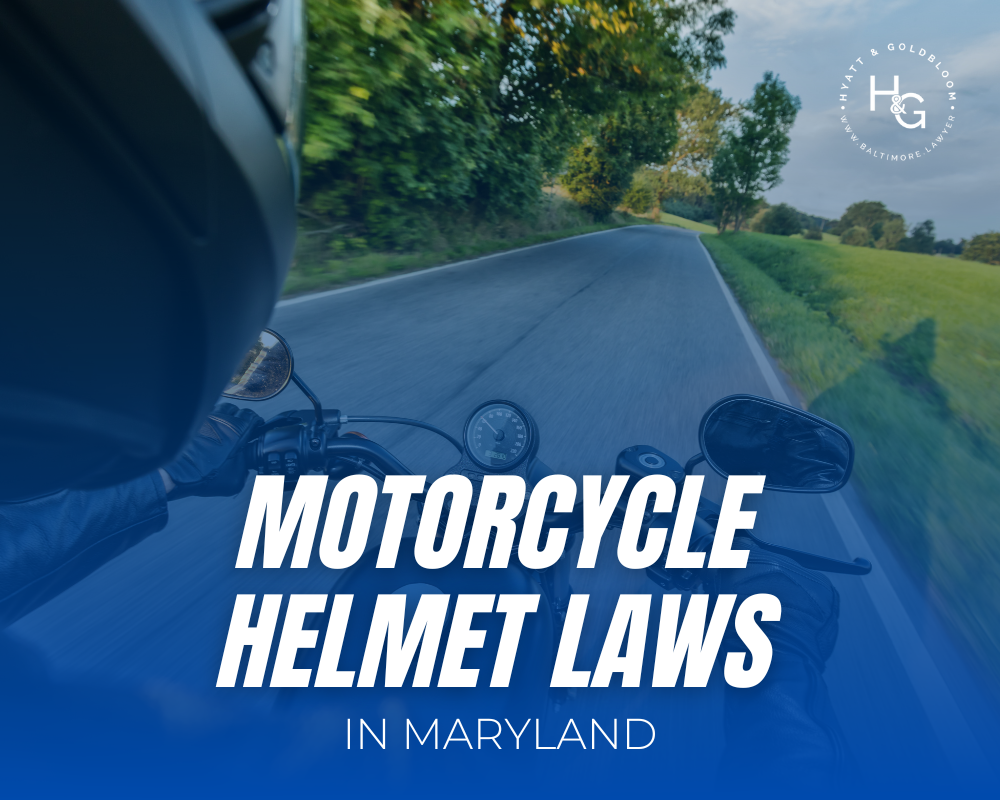Motorcycle Helmet Laws In Maryland
Did you know that many motorcycle riders are unaware of their state’s helmet laws until after they get hurt in an accident? If you want to have a chance at being compensated for damages post-accident, it is crucial to follow your state’s motorcycle helmet regulations. In Maryland, for example, not wearing a Helmet could mean the difference between winning and losing your case.
Maryland law requires all motorcyclists to wear helmets while operating their vehicles. This is because motorcycles do not offer much protection to drivers and a helmet could help prevent head injuries in the event of an accident. According to M. Code Transp. Article 21-1306, if you are caught driving without an approved helmet from the Maryland Motor Vehicle Administration, you may face penalties. Not wearing a helmet at the time of an accident caused by another driver’s negligence can also affect your ability to file a personal injury lawsuit against them.
At Hyatt & Goldbloom, our team of personal injury attorneys is dedicated to helping motorcycle accident victims get the compensation they deserve. Our Maryland motorcycle accident lawyers prioritize our clients’ interests and aim to surpass their expectations during settlement. Contact our office today for a free consultation and to learn more about how we can help you.
Approved Motorcycle Helmets vs Unapproved Motorcycle Helmets in Maryland
The main reason motorcyclists wear helmets is for safety, as head injuries from motorcycle accidents can be incredibly severe. In Maryland, only certain types of helmets are approved by the state’s Motor Vehicle Administration. To be approved, a helmet must have specific qualities.
Approved Helmets
There are four elements your motorcycle helmet must possess to be legal in Maryland: an outer shell, a shock-absorbing liner, a comfort liner, and a retention system (better known as a chin strap). The raw materials for these components may vary–for instance, the outer shell can comprise carbon fiber or thermoplastic–but they all serve the same purpose: greater comfort while riding and better protection against accidents.
Unapproved Helmets
Maryland Motor Vehicle Administration doesn’t advocate for second-hand or ill-fitting helmets for motorcyclists. If a helmet is too big or small, it might not work as intended in an accident and fail to properly protect your head. Additionally, any helmets without a retention system – aka a chin strap – are also unapproved. Remember, motorcycle helmets exist firstly to protect you rather than be stylish.
Motorcyclists in Maryland can tell if their helmet meets state standards by looking for a Department of Transportation, or “DOT,” label. Manufacturers put these labels on approved helmets so that riders can easily choose the right headgear.
Motorcycle Safety Laws in Maryland
If you or a loved one were to get hurt in a motorcycle accident while wearing an approved helmet, then filing for compensation would likely be an option. In addition to Maryland’s motorcycle helmet laws, there are other regulations that all motorcyclists should know about.
If you operate a motorcycle in Maryland, it must have an approved windshield – unless the operator is wearing protective goggles. If you don’t follow these rules, not only can crashes occur, but also your charges may not be filed in court.
If you’re involved in a motorcycle accident in Maryland, the negligent party may be held responsible for your medical bills. This is because Maryland follows a fault-based system, as opposed to no-fault states where an accident cannot be blamed on any one driver. To receive financial support for expenses such as medical bills, you might have to file a personal injury lawsuit.
Wearing an approved helmet and following state motorcycle laws are always crucial, but it is especially important to do so in Maryland. In fact, if you are even 1% at fault for your injuries, the state’s contributory negligence laws could prevent you from seeking damages. Additionally, the statute of limitations to bring civil action is three years in Maryland. Because Maryland is a “Fault” state, suing might be your best route to compensation.
MVA Motorcycle Safety Gear Recommendations
Motorcycle riders who do not wear DOT-certified helmets and glasses are breaking the law. However, because motorcyclists taking any of the MVA’s rider courses must use additional protective gear, this is a legal requirement. From a legal standpoint, this equipment is optional, though it is strongly advised for optimum motorcycle safety.
Full-Fingered Gloves
The best gloves will provide an optimal grip in any weather condition or if the rider’s hands are sweaty. Full-fingered gloves made of leather or synthetic materials typically offer the best grip and protection.
Long Pants
Most people think that any old pair of jeans will suffice for riding a motorcycle, but standard denim is not sturdy enough. Lined with Kevlar or leather, special Riding jeans are purpose-built to protect riders while providing comfort and mobility.
Long-Sleeved Jacket or Shirt
While any long-sleeved shirt will work for a rider course, the MVA suggests motorcycle-specific gear. Not only does this type of clothing provide more safety protection, but it also helps riders stay comfortable in harsh weather conditions. Leather is usually the most protective option, although it can get warm quickly. Instead, many people prefer newer textile riding jacket systems because they’re more versatile and comfortable. Most include removable thermal layers and a water-resistant liner.
Over-The-Ankle Shoes or Boots
Low-heeled footwear with rubber or non-slip soles is best for control operation since it provides better grip and comfort on the foot controls.
Contact Our Motorcycle Accident Attorneys Today
Although motorcycle safety equipment is critical, sometimes it’s not enough when another negligent driver causes an accident. If you’ve been injured in a motorcycle accident, contact our Maryland motorcycle accident attorneys at Hyatt Goldbloom today. Call our office for a free consultation with one of our team members to learn more about how we can help you and your family.


